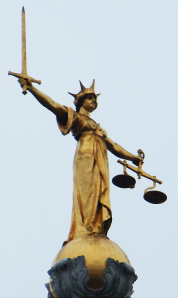By: Chris Knowles
Aeneas Lavinium

Statue of Justice on top of the Old Bailey in London
Is it possible to have a multicultural society and a just society all at the same time? I would argue that it is but that it would require wise lawmakers (which we don’t have) and a willingness to pay any associated financial costs.
Cost would be the factor that would determine whether someone was in favour of multiculturalism and justice or whether they would prefer the cheaper and the easier option of one or the other or indeed in extreme cases neither.
The exemption of Sikhs from wearing crash helmets on motorcycles or the issue of Halal and Kosher food illustrate the choices that are made when trying to balance the needs of culture with the desire to have laws that govern a particular activity. Unfortunately a balance between equality and diversity has not been reached on these issues.
I am in favour of the process of intercultural dialogue that has been established between Tommy Robinson and the Quilliam Foundation, and indeed I think this is a process in which others should be involved. The balance between culture and equality is certainly something that should be discussed as part of such a process to create a more cohesive and just society.
I recently became involved in a discussion at Harry’s Place that caused me to write down my own ideas on the subject of balancing equality and diversity. What follows relates to this discussion.
I suggested that in the case of turbans and motorcycles, people could be given a choice between wearing a crash helmet or a turban. As an alternative I put forward the option of getting rid of laws that require the wearing of head protection on motorcycles altogether. Both these options would respect both equality and diversity and therefore could be considered more just than the current arrangements.
Since the 1970s much of our liberty has been whittled away via over legislation. If convincing arguments can be made for exemptions then it shows that such laws were not really needed in the first place. We did indeed manage without such a motorcycle helmet law prior to 1973! Predictably the matter of health care costs was brought up in relation to not wearing crash helmets which of course is a fair point. However, such an argument could be regarded as one that is against socialised medicine because it demonstrates that more socialised medicine can result in the erosion of basic liberties. If socialised health care is a tool of coercion and control then it is a bad thing. Personally I think the NHS is a good thing, but believe that it should not be used as a tool to undermine individual liberty. It is immoral to force someone to choose between liberty and health!
It is my opinion that exemptions to the law undermine the rule of law and bring it into disrepute. If someone is able to be exempt then all should be exempt. Equality before the law is one of our most basic principles of justice and exceptions breed injustice. Exceptions also demonstrate laziness on the part of lawmakers. They show that lawmakers do not understand the society that they are making laws for.
If a multicultural society wants more laws while staying true to the principles of equality and diversity it has to choose between the purpose of the particular law (safety in the case of crash helmets, animal welfare considerations in the case of Halal/Kosher) and cultural considerations. It is quite clear that the law cannot have both in their pure forms and remain just.
Exemptions are yet another example of how diversity seems to trump equality when it should be the other way around. It is not possible to have pure equality and pure diversity at the same time. Lawmakers should not sidestep the issue when legislating but address it. The only way to address it and maintain respect for equality and diversity is to choose one of the following three options:
- Legislating in such a way so as not to outlaw the cultural practice but ensure that the law is applied equally (i.e. helmet OR turban for protection, and making different standards of animal welfare in the case of Halal/Kosher so that these practices are not considered cruel as far as the law is concerned).
- Technological innovations that allow for the cultural requirement but maintain the legal standard.
- Deciding not to have a law on that particular issue on the grounds that it is not important enough to apply to all.
The alternative is to have a law that chooses between equality and diversity. As things stand it is diversity that has been declared to be legally superior to equality and injustice has been unleashed.

















